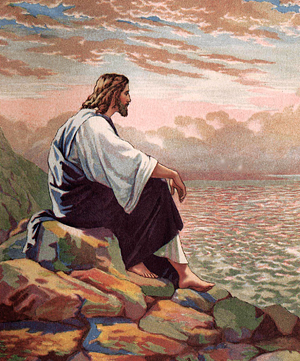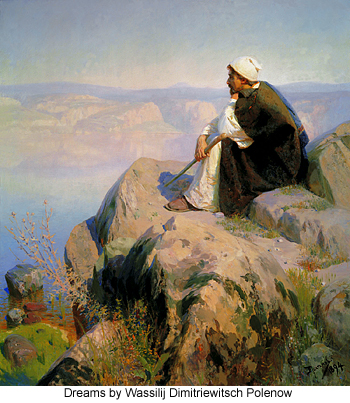
Make it a Habit
More of the character and merciful nature of the Eternal Son of mercy you should comprehend as you meditate on the revelation of these divine attributes which was made in loving service by your own Creator Son, onetime Son of Man on earth, now the exalted sovereign of your local universe — the Son of Man and the Son of God. ~ The Urantia Book, (7:7.6)
Religious habits of thinking and acting are contributory to the economy of spiritual growth. One can develop religious predispositions toward favorable reaction to spiritual stimuli, a sort of conditioned spiritual reflex. Habits which favor religious growth embrace cultivated sensitivity to divine values, recognition of religious living in others, reflective meditation on cosmic meanings, worshipful problem solving, sharing one's spiritual life with one's fellows, avoidance of selfishness, refusal to presume on divine mercy, living as in the presence of God. The factors of religious growth may be intentional, but the growth itself is unvaryingly unconscious. ~ The Urantia Book, (100:1.8)
The more healthful attitude of spiritual meditation is to be found in reflective worship and in the prayer of thanksgiving. ~ The Urantia Book, (100:5.10)
The mechanistic naturalism of some supposedly educated men and the thoughtless secularism of the man in the street are both exclusively concerned with things; they are barren of all real values, sanctions, and satisfactions of a spiritual nature, as well as being devoid of faith, hope, and eternal assurances. One of the great troubles with modern life is that man thinks he is too busy to find time for spiritual meditation and religious devotion. ~ The Urantia Book, (195:6.7)
Meditation and the First Human Family
Imagine our joy one day - the twins were about ten years old - when the spirit of worship made its first contact with the mind of the female twin and shortly thereafter with the male. We knew that something closely akin to human mind was approaching culmination; and when, about a year later, they finally resolved, as a result of meditative thought and purposeful decision, to flee from home and journey north, then did the spirit of wisdom begin to function on Urantia and in these two now recognized human minds. ~ The Urantia Book, (62:6.5)
Meditation and Service
The contact of the mortal mind with its indwelling Adjuster, while often favored by devoted meditation, is more frequently facilitated by wholehearted and loving service in unselfish ministry to one's fellow creatures.
Jesus often took his apostles away by themselves for short periods to engage in meditation and prayer, but for the most part he kept them in service-contact with the multitudes. The soul of man requires spiritual exercise as well as spiritual nourishment. ~ The Urantia Book, (91:7.1)
Meditation and Decision
Man can never wisely decide temporal issues or transcend the selfishness of personal interests unless he meditates in the presence of the sovereignty of God and reckons with the realities of divine meanings and spiritual values. ~ The Urantia Book, (99:7.4)
 Jesus and Meditation
Jesus and Meditation
When this, his second day in the temple, was finished, again he went to Bethany for the night. And again he went out in the garden to meditate and pray. It was apparent that his mind was concerned with the contemplation of weighty problems. ~ The Urantia Book, (125:4.4)
This is the calendar year of his fourteenth birthday. He had become a good yoke maker and worked well with both canvas and leather. He was also rapidly developing into an expert carpenter and cabinetmaker. This summer he made frequent trips to the top of the hill to the northwest of Nazareth for prayer and meditation. ~ The Urantia Book, (126:1.1)
His profound periods of meditation, his frequent journeys to the hilltop for prayer, and the many strange ideas which Jesus advanced from time to time, thoroughly alarmed his mother. Sometimes she thought the lad was beside himself, and then she would steady her fears, remembering that he was, after all, a child of promise and in some manner different from other youths. ~ The Urantia Book, (126:3.13)
As he grew up to manhood, he passed through all those conflicts and confusions which the average young persons of previous and subsequent ages have undergone. And the rigorous experience of supporting his family was a sure safeguard against his having overmuch time for idle meditation or the indulgence of mystic tendencies. ~ The Urantia Book, (126:5.9)
This year his seasons of deep meditation were often broken into by Ruth and her playmates. And always was Jesus ready to postpone the contemplation of his future work for the world and the universe that he might share in the childish joy and youthful gladness of these youngsters, who never tired of listening to Jesus relate the experiences of his various trips to Jerusalem. ~ The Urantia Book, (128:6.10)
The Forty Days
Jesus did not go into retirement for the purpose of fasting and for the affliction of his soul. He was not an ascetic, and he came forever to destroy all such notions regarding the approach to God. His reasons for seeking this retirement were entirely different from those which had actuated Moses and Elijah, and even John the Baptist. Jesus was then wholly self-conscious concerning his relation to the universe of his making and also to the universe of universes, supervised by the Paradise Father, his Father in heaven. He now fully recalled the bestowal charge and its instructions administered by his elder brother, Immanuel, ere he entered upon his Urantia incarnation. He now clearly and fully comprehended all these far-flung relationships, and he desired to be away for a season of quiet meditation so that he could think out the plans and decide upon the procedures for the prosecution of his public labors in behalf of this world and for all other worlds in his local universe. ~ The Urantia Book, (136:3.3)
These forty days were the occasion of the final conference between the human and the divine minds, or rather the first real functioning of these two minds as now made one. The results of this momentous season of meditation demonstrated conclusively that the divine mind has triumphantly and spiritually dominated the human intellect. The mind of man has become the mind of God from this time on, and though the selfhood of the mind of man is ever present, always does this spiritualized human mind say, "Not my will but yours be done." ~ The Urantia Book, (136:4.4)
By the third day of his solitary meditations the human body grew hungry. Should he go in quest of food as any ordinary man would, or should he merely exercise his normal creative powers and produce suitable bodily nourishment ready at hand? And this great decision of the Master has been portrayed to you as a temptation — as a challenge by supposed enemies that he "command that these stones become loaves of bread." ~ The Urantia Book, (136:6.1)
After Cana
That night Jesus did not sleep. Donning his evening wraps, he sat out on the lake shore thinking, thinking until the dawn of the next day. In the long hours of that night of meditation Jesus came clearly to comprehend that he never would be able to make his followers see him in any other light than as the long-expected Messiah. At last he recognized that there was no way to launch his message of the kingdom except as the fulfillment of John's prediction and as the one for whom the Jews were looking. After all, though he was not the Davidic type of Messiah, he was truly the fulfillment of the prophetic utterances of the more spiritually minded of the olden seers. Never again did he wholly deny that he was the Messiah. He decided to leave the final untangling of this complicated situation to the outworking of the Father's will. ~ The Urantia Book, (137:5.3)
 Rodan Speaks of Jesus and Meditation
Rodan Speaks of Jesus and Meditation
But the greatest of all methods of problem solving I have learned from Jesus, your Master. I refer to that which he so consistently practices, and which he has so faithfully taught you, the isolation of worshipful meditation. In this habit of Jesus' going off so frequently by himself to commune with the Father in heaven is to be found the technique, not only of gathering strength and wisdom for the ordinary conflicts of living, but also of appropriating the energy for the solution of the higher problems of a moral and spiritual nature. But even correct methods of solving problems will not compensate for inherent defects of personality or atone for the absence of the hunger and thirst for true righteousness.
I am deeply impressed with the custom of Jesus in going apart by himself to engage in these seasons of solitary survey of the problems of living; to seek for new stores of wisdom and energy for meeting the manifold demands of social service; to quicken and deepen the supreme purpose of living by actually subjecting the total personality to the consciousness of contacting with divinity; to grasp for possession of new and better methods of adjusting oneself to the ever-changing situations of living existence; to effect those vital reconstructions and readjustments of one's personal attitudes which are so essential to enhanced insight into everything worth while and real; and to do all of this with an eye single to the glory of God — to breathe in sincerity your Master's favorite prayer, "Not my will, but yours, be done."
This worshipful practice of your Master brings that relaxation which renews the mind; that illumination which inspires the soul; that courage which enables one bravely to face one's problems; that self-understanding which obliterates debilitating fear; and that consciousness of union with divinity which equips man with the assurance that enables him to dare to be Godlike. The relaxation of worship, or spiritual communion as practiced by the Master, relieves tension, removes conflicts, and mightily augments the total resources of the personality. And all this philosophy, plus the gospel of the kingdom, constitutes the new religion as I understand it. ~ The Urantia Book, (160:1.10)
Jesus has taught us that God lives in man; then how can we induce man to release these soul-bound powers of divinity and infinity? How shall we induce men to let go of God that he may spring forth to the refreshment of our own souls while in transit outward and then to serve the purpose of enlightening, uplifting, and blessing countless other souls? How best can I awaken these latent powers for good which lie dormant in your souls? One thing I am sure of: Emotional excitement is not the ideal spiritual stimulus. Excitement does not augment energy; it rather exhausts the powers of both mind and body. Whence then comes the energy to do these great things? Look to your Master. Even now he is out in the hills taking in power while we are here giving out energy. The secret of all this problem is wrapped up in spiritual communion, in worship. From the human standpoint it is a question of combined meditation and relaxation. Meditation makes the contact of mind with spirit; relaxation determines the capacity for spiritual receptivity. And this interchange of strength for weakness, courage for fear, the will of God for the mind of self, constitutes worship. At least, that is the way the philosopher views it.
When these experiences are frequently repeated, they crystallize into habits, strength-giving and worshipful habits, and such habits eventually formulate themselves into a spiritual character, and such a character is finally recognized by one's fellows as a mature personality. These practices are difficult and time-consuming at first, but when they become habitual, they are at once restful and timesaving. The more complex society becomes, and the more the lures of civilization multiply, the more urgent will become the necessity for God-knowing individuals to form such protective habitual practices designed to conserve and augment their spiritual energies. ~ The Urantia Book, (160:3.1)
On every mountaintop of intellectual thought are to be found relaxation for the mind, strength for the soul, and communion for the spirit. From such vantage points of high living, man is able to transcend the material irritations of the lower levels of thinking — worry, jealousy, envy, revenge, and the pride of immature personality. These high-climbing souls deliver themselves from a multitude of the crosscurrent conflicts of the trifles of living, thus becoming free to attain consciousness of the higher currents of spirit concept and celestial communication. But the life purpose must be jealously guarded from the temptation to seek for easy and transient attainment; likewise must it be so fostered as to become immune to the disastrous threats of fanaticism. ~ The Urantia Book, (160:3.5)
To Peter:
Jesus then turned toward Peter and asked,
"Peter, do you love me?" Peter answered, "Lord, you know I love you with all my soul." Then said Jesus: "If you love me, Peter, feed my lambs. Do not neglect to minister to the weak, the poor, and the young. Preach the gospel without fear or favor; remember always that God is no respecter of persons. Serve your fellow men even as I have served you; forgive your fellow mortals even as I have forgiven you. Let experience teach you the value of meditation and the power of intelligent reflection." ~ Jesus, The Urantia Book, (192:2.2)
In the Master's life on Urantia, this and all other worlds of the local creation discover a new and higher type of religion, religion based on personal spiritual relations with the Universal Father and wholly validated by the supreme authority of genuine personal experience. This living faith of Jesus was more than an intellectual reflection, and it was not a mystic meditation. ~ The Urantia Book, (196:0.4)
Meditation and The Spirit of Truth
The bestowal of the Spirit of Truth was independent of all forms, ceremonies, sacred places, and special behavior by those who received the fullness of its manifestation. When the spirit came upon those assembled in the upper chamber, they were simply sitting there, having just been engaged in silent prayer. The spirit was bestowed in the country as well as in the city. It was not necessary for the apostles to go apart to a lonely place for years of solitary meditation in order to receive the spirit. For all time, Pentecost disassociates the idea of spiritual experience from the notion of especially favorable environments. ~ The Urantia Book, (194:3.10)


